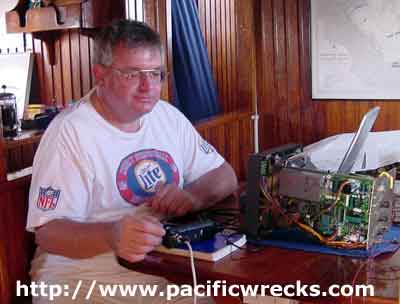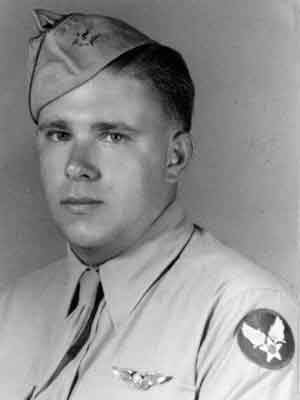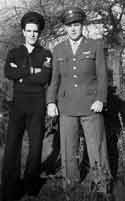
Don Fetterly working with sonar
gear aboard the Barbarian

Don Fetterly at Kavieng with a silvertip shark at less than 3 feet.
Photograph by Bob Halstead.
Tell a little about yourself, and your background
I grew up in Seattle Washington the eldest of three brothers, and my fondest memories are of summer vacations spent at my grandparent's estate at Glenn Cove on Puget Sound. My cousins and I were constantly on or in the water. My father took up diving when I was young and used to do both hard hat and scuba diving at the cove and in Puget Sound near our home. I would accompany him to the beach and wonder what he was seeing. It was during this time when I became interested in the sport. I grew up watching Sea Hunt and The Undersea World of Jacques Cousteau on television. I did not begin diving until many years later in 1986 when I was encouraged to do so by a girlfriend.Formal schooling was completed in 1973 when I graduated from the University of Washington with a bachelor's degree in Electrical Engineering. I was signed up for graduate school but decided to accept an offer with an aerospace company in Southern California developing advanced technology products. As noted above I took up diving in 1986.
As noted above I took up diving in 1986. Living in Southern California I was able to take advantage of weekend diving along the coast and onboard charter dive boats that went out to the Channel Islands. A few years ago I was transferred to a facility in the desert Southwest where I continue my work with advanced technology. The move severely impacted my ability to go diving just about every weekend. I now take on average one month long diving expedition to the South Pacific each year to recharge my spirit and get as far away from civilization as I can. This is easily accomplished in Papua New Guinea.
Do you have any relatives that served in the Pacific?
My father was in the Army Air Corps 5th Air Force Headquarters Command. Dad was trained as a Norden Bomb Sight Technician and served at bases in Arizona and New Mexico training bombardiers. Near the end of the war his unit was shipped to the Philippines by way of Australia. He was scheduled to take part in the invasion of Japan. While they were at sea the war ended. He was then assigned to take part in the occupation of Japan where he served with an intelligence unit whose task it was to ferret out war materials hidden by Japanese industry. He was discharged in February of 1946 and returned to Seattle Washington his home where he married my mothera couple of year later. Two uncles served in the Navy, one was stationed in Alaska and the other served in the Central and South West Pacific theaters of operation.
How did you get interested in Pacific WWII?
I have been a history buff for as long as I can remember encouraged to explore history by my parents. My father had a large collection of books on World War II, which I read while growing up. I was given most of these before my father passed away nearly three years ago. Diving also drove me to focus attention on the Pacific and especially South Pacific with its warm water and large number of wrecks that are at diveable depths.As I became more and more involved in researching wrecks for various dive operators in New Guinea encouraged and aided by my father, I sought out the men who had fought the action for interviews. These men both here in the US and in Australia provided invaluable insight and first hand knowledge of what occurred which in most cases goes way beyond that contained in official reports.
These interviews greatly affect me, as many of the men have not talked about their experiences to anyone not even their families for nearly 60 years. I have been thanked countless times by these men for asking about what they went through and writing it down so others will know. The fact that anyone cares and appreciates what they did means so much to them.
On several occasions the men told me that when sent photos of the area they fought in taken during an expedition their grown children expressed for the first time a deep desire to learn about what he did in the war bringing the family closer.
Next Question | Don Fetterly Main Page

